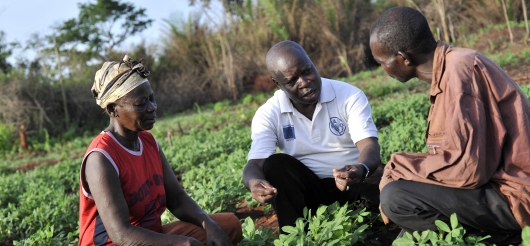
Who we are
An intergovernmental organization, FAO has 194 Member Nations, two associate members and one member organization, the European Union. Its employees come from various cultural backgrounds and are experts in the multiple fields of activity FAO engages in. FAO’s staff capacity allows it to support improved governance inter alia, generate, develop and adapt existing tools and guidelines and provide targeted governance support as a resource to country and regional level FAO offices. Headquartered in Rome, Italy, FAO is present in over 130 countries.
Structure and finance
Governance
Representatives of members meet at the biennial FAO Conference to review global governance policy issues and international frameworks, as well as to evaluate work carried out and to approve the budget for the next biennium. The Conference elects Council Members, to serve three-year rotating terms to carry out executive oversight of programme and budgetary activities. The Conference also elects a Director-General to a four year term of office, renewable once. The current Director-General, Qu Dongyu, assumed his functions on 1 August 2019 for a term which expires on 31 July 2023.
FAO’s new focus on governance is driven by the recognition that mission-critical development-related processes affecting food security and nutrition, livelihoods, and the management and sustainable use of natural resources confront increasingly complex governance challenges. Broader, more flexible and responsive, and more capable governance institutions and mechanisms are necessary to improve effective coordination among diverse stakeholders, enabling problem-solving while working towards the achievement of multiple, and sometimes conflicting, objectives.
FAO promotes good practice in addressing governance challenges across its Strategic Objectives by strengthening its contribution to global governance, identifying mission-critical governance issues at national, regional and multilateral levels, strengthening staff capacity to support improved governance and monitoring and evaluating its interventions assessing its experiences for lessons learnt with a view to build our governance-suport capacities.
Departments
- Agriculture and Consumer Protection
- Climate, Biodiversity, Land and Water Department
- Corporate Services
- Economic and Social Development
- Fisheries and Aquaculture
- Forestry
- Technical Cooperation and Programme Management
- Worldwide Offices
FAO’s decentralized network includes five regional offices, ten subregional offices, 85 fully fledged country offices (excluding those hosted in regional and subregional offices) of which six are Partnership and Liaison Offices, 37 countries covered through multiple accreditation, 1 Programme Office, 4 National Correspondents, 6 Liaison Offices, 2 Information Offices, and 2 other representation arrangements.
Employees
As of 14 February 2019, FAO employed 11.561 employees, 32 percent are based at headquarters in Rome, while the remainder work in offices worldwide. The 86 percent of the 194 member states are equitably represented. Since 2012, the proportion of women in the professional staff category increased from 36% to 43%.
Programmes and projects
In 2016-17, FAO implemented programmes and projects with a total value of USD 1 627 million. About eight percent are funded by assessed contributions through the FAO Technical Cooperation Programme (TCP). The remaining 92 percent are funded from voluntary contributions, through the Government Cooperative Programme (34 percent), Unilateral Trust Fund (UTF) (five percent) and other forms of Trust Funds (53 percent) that include UN Joint Programmes.
Funding and expenditure
FAO's overall programme of work is funded by assessed and voluntary contributions. The total FAO Budget planned for 2018-19 is USD 2.6 billion. Of this amount, 39 percent comes from assessed contributions paid by member countries, while 61 percent will be mobilized through voluntary contributions from Members and other partners. Member countries' assessed contributions comprise the regular budget, set at the biennial FAO Conference. The FAO regular budget for the 2018- 19 biennium is USD 1,005.6 million.
